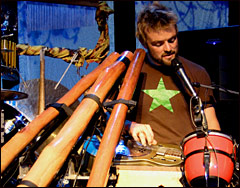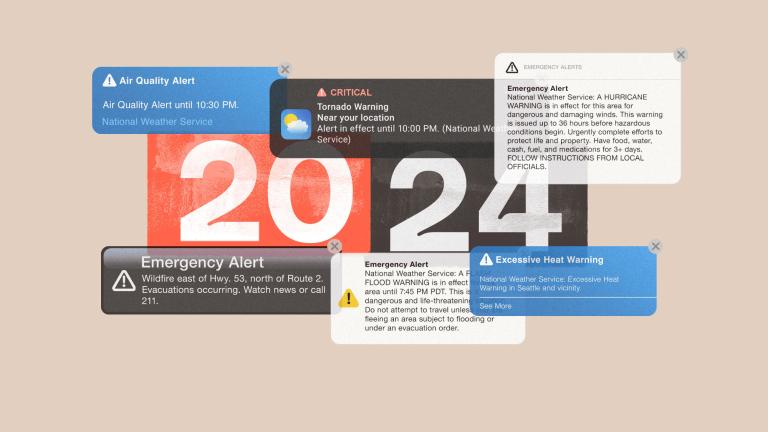
When Australian musician Xavier Rudd was 10 years old, he realized that he could reuse an old vacuum-cleaner hose as a didgeridoo. Talk about a career rooted in green values.
Since then, Rudd has moved on from vacuum-cleaner hoses to guitars, harmonicas, banjos, lapsteels, and even real didgeridoos — but his environmental ethics remain the same. The singer/songwriter/one-man-band is an avid supporter of several environmental organizations and often incorporates socially conscious lyrics into his bluesy roots music: His White Moth single “Better People” — which opens “People saving whales/And giving your thanks to our seas/My respect to the ones in the forest/Standing up for our old trees” — celebrates people making a positive impact in the world.
Last year, he partnered with Clif Bar’s GreenNotes program to green his U.S. tour and create the Better People Campaign, an effort to profile people doing good. Now Rudd is once again on the road, touring North America before hitting a slew of music festivals in Australia next month.
I first met him at Bonnaroo, a music fest continually working to reduce its own footprint. We sat cross-legged under a shade tree — me, wiping the sweat from my brow and trying to keep from burning, and he, seemingly carefree as he plucked blades of grass and dug his bare toes into the dusty ground — as we chatted about exploring a new continent, sharing his love of the land with his kids, and dealing with the toxicity of life on tour.
How did you get involved in your partnership with Clif Bar GreenNotes?
I’m pretty physical when I’m on the road — my show’s fairly physical. And I got told that I should drink some electrolytes when I’m sweating and stuff for my muscles or whatnot. So I asked my guitar tech whether there were any organic ones, and he looked it up and found that Clif Bar made one, so he contacted them and asked them about it … So that’s how the communication got going, and then my manager ended up talking to them about this whole GreenNotes program, which was amazing for me because I come from a fairly carbon-neutral existence in a small town in the bush, and coming out on the road in this toxic existence is hard to deal with — diesel tour buses, power-sucking P.A. systems, and all the rest. It’s hard to know where to begin, you know? Having a company that knows the country and is offering to help us reduce our emissions over here is incredible.
What was it like coming over here to the U.S.?

Rudd’s one-man band.
Photo: James Looker
Everything’s big. That’s sort of what I noticed. Cars and buildings and highways — everything’s big. But it’s a trade.
I’m lucky to get to travel. I think America’s a beautiful place. I find it a really warm, welcoming place — lots of ethnic diversity. In lots of the world, America is represented by its media and its government because of the size of it. The core of the culture and the beauty of the people isn’t the forefront of what’s represented. So to come here and connect with the real America, for me, is powerful.
Where do you think your environmental ethics came from?
I just always had a big love for this earth. I come from a land that’s very, very powerful, and I guess everything we do is sort of floating on the surface. This place that we’ve been gifted is beyond any of our understandings. It’s pretty powerful, so I think it’s just necessary to respect that.
How are you going to pass along environmental ethics to your kids?
I’m not going to pass anything along — it’s just what they’re meant to pick up and where their journey takes them. It’s how the cycle works. I don’t think about it too much. But we’re close. We enjoy the land together. And the land takes care of the human spirit.
I know you’re involved in Surfers Against Sewage and some other projects like that because you are a surfer yourself. What issues are most important to you?
I’m lucky because we get to hear about so many different organizations doing good things. Everyone that’s doing something good for the earth is important. I guess the things that are closest to my heart at the moment are probably the Sea Shepherds out there looking after our sea life. They’ve been doing a lot down in our waters at the moment for our whales.
Also in the Huon Valley in Tasmania, old-growth [woods are] still being cleared down there and being sent to Japan for pulp. There’s a community of environmentalists down there who struggle to have a voice because Tasmania’s so removed from our mainland. They’re doing amazing things in a really redneck place. I’m pretty passionate about what they’re doing.
What do you think about the efforts of Bonnaroo and other music festivals to be more green?
It’s super important. It’s not happening enough. You would think that in the music industry there’d be a greener effort, but there’s not. It’s a very toxic existence. And it’s really important that the people with the budget in the music industry — like big festivals and record companies — make change and move forward with greener approaches.
Watch Rudd’s “Better People” video:
http://www.youtube.com/watch?v=IxZijEeTCXY&rel=1

